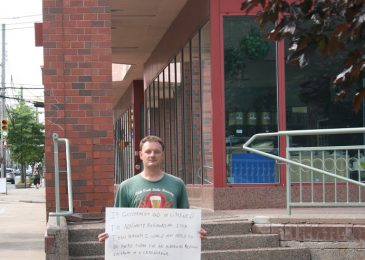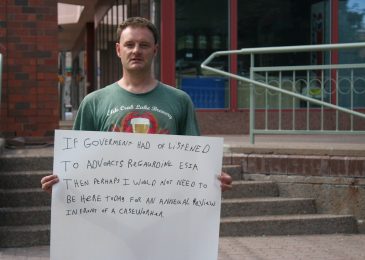I want to start this article off by sending a strong message to Joanne Bernard, the Minister of Community Services.
Joanne Bernard, hurry up and make changes to the social assistance system! We, the people on social assistance, are struggling more and more every day as we wait for the promised reforms to wrap up. Policy changes are not happening soon enough, more and people are losing special needs allowance and are having other problems with the system.
Let’s take a look at the much feared Annual Review, as an example of all that’s wrong with the current system. Each year everyone on social assistance gets called in to meet with their caseworker, to see if you still qualify for assistance and receive the right benefits. If Community Services is going to make any cuts to a client’s allowance, this is when the cuts happen.
I just want to mention at this point that I recently had my own Annual Review. I will say that the caseworker I had this time around was one of the better ones I have ever had. But even the best caseworker in the world can only do so much. It’s the Annual Review itself and the policies and regulations around it that are the problem.
To take this one step further, you could even say that what’s behind the regulations is the problem.

In the regulations income assistance is considered an income of last resort. Things would change if government started thinking about social assistance as an income to support those in need, or an income to support those who live with disabilities, whatever the case may be.
This wording would allow caseworkers to base their decisions more on the actual needs of the clients. And it would show respect for persons with disabilities (both physical and mental) who are on the system. You wouldn’t have to prove your financial need for assistance year after year. Respect is very much lacking in the current system!
However in order to achieve such a respectful system a lot of work needs to be done. Government needs to show that they are paying attention to people who the system serves.
The Guaranteed Basic Income which I talked about in my last Nova Scotia Advocate article is the best system to achieve this . Under this system, caseworkers would not even be needed. But it’s doubtful such a system will become political reality in Nova Scotia any time soon.
So let’s take a look at the questions that should no longer be asked during the Annual Review.
#1 – Do you have boarders and roomers?
When you are on income assistance, because of the shelter allowance limits being what they are, income assistance clients cannot afford big enough places for boarders and roomers. When you live in a one-bedroom apartment, are you going to have people living with you? Of course not!
#2 – Do you receive child/spousal) maintenance support?
Clients who are receiving these supports are single moms who have young children living at home with them. They cannot support their child without this source of income.
The sad thing is that when a single mom is receiving this child support income, it is deducted from her income assistance allowances. This needs to change in order for single moms to provide a better life for their child. This action not only keeps the single mom in poverty, it is also a human rights violation for the child.
#3 – Do you receive rental income from properties you own?
It’s simple – to own such property is an expense that income assistance client cannot afford.
#4 – Do you have cash on hand?
This question asked during annual reviews often makes the client feel that they are expected to empty their pockets in front of the caseworker. This is a human rights violation.
This question is also a good example of how the annual review is set up for caseworkers to put their noses to clients’ business. The whole structure on the annual review needs to change.
#5 – Income assistance clients who are in common-law relationships or married are required to bring their spouses to their annual review.
Being in a relationship while on income assistance has effect on the allowance the couple is entitled to. Typically you end up getting one allowance for both spouses, which puts both who are living together in more poverty. Whether you are a couple living together or not, each person should be entitled to their own allowance.
On this topic, I find that something that advocates are not addressing when they are speaking of policy change is what happens when two people who are on income assistance decide to live together. These arrangements aren’t necessarily romantic! It could just mean the two people just being roommates. Yet assistance often is decreased as if these people are a couple.
What the Annual Review clearly shows is that a different system needs to be created!




